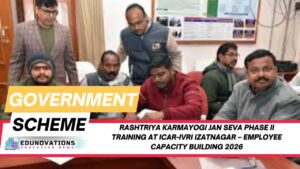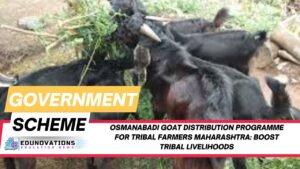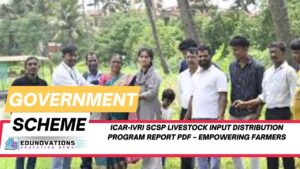Explore how the Scheduled Caste farmer training program Himachal Pradesh 2025 enhanced local farming, introduced HS562 wheat, and improved livelihoods.
The Indian Agricultural Research Institute (IARI), Regional Station, Shimla, recently organized a Scheduled Caste farmer training program Himachal Pradesh 2025 aimed at enriching Scheduled Caste farmers and promoting scientific agriculture. Conducted at the Krishi Vigyan Kendra (KVK) in Sunder Nagar, Mandi district, this one-day initiative brought together over 100 farmers to gain hands-on experience and access to modern agricultural techniques.
The program was part of the Scheduled Caste Sub-Plan, a government initiative under the Ministry of Agriculture & Farmers Welfare, designed to uplift marginalized communities by providing resources, training, and guidance on profitable farming. By focusing on local needs, crop improvements, and technological adoption, the program sought to transform traditional farming practices into sustainable, income-generating ventures.
Focus on Improved Wheat Seeds: HS562 Distribution
A key highlight of the training was the distribution of improved wheat HS562 seeds to SC farmers. HS562, a high-yielding wheat variety, is scientifically developed to enhance crop productivity, resist local pests, and thrive in Himachal Pradesh’s agro-climatic conditions. Farmers also received essential agricultural implements such as spades, sickles, steel buckets, pads, bags, and crates, ensuring they could implement modern farming methods immediately.
Dr. Dharam Pal, Head of IARI Regional Station, Shimla, emphasized the significance of adopting improved wheat varieties for enhancing profitability. He explained the wheat HS562’s characteristics, including drought resistance, disease tolerance, and higher grain output, and encouraged farmers to integrate scientific cultivation practices into their daily routines.
Krishi Vigyan Kendra Sunder Nagar Agricultural Training: Empowering Farmers
The Krishi Vigyan Kendra Sunder Nagar agricultural training served as the core platform for knowledge exchange. Dr. Pankaj Sood, coordinator at KVK Mandi, provided detailed guidance on advanced farming techniques, the use of modern equipment, and government schemes tailored for Scheduled Caste farmers. Farmers learned about soil management, crop rotation, pest management, and post-harvest practices that directly affect farm income.
Dr. Kallol Kumar Pramanick addressed scientific fruit cultivation methods suitable for the Mandi region. He emphasized climate-resilient varieties, pruning techniques, and organic fertilization to increase both yield and quality. Dr. Neha Chauhan, soil scientist at KVK, provided insights into fertilizer management, highlighting the importance of balanced nutrient application for sustainable farming.
Integrating Modern Farming Techniques for Profitable Agriculture
Modern farming methods play a crucial role in elevating the income of small farmers. Experts recommended integrating:
- Soil testing and nutrient management to optimize fertilizer use.
- Mechanized tools such as spades, sickles, and crates to reduce labor and improve efficiency.
- High-yield varieties like HS562 wheat to maximize output per acre.
- Scientific fruit cultivation suitable for Himachal Pradesh’s terrain.
The program reinforced the significance of using chemical fertilizers and pesticides in a balanced manner, as advised by Gram Panchayat leaders Mr. Bishan Das (Kanaid), Mr. Govind Ram (Barsu), and Mr. Panna Lal (Lohara). They stressed regular consultations with scientists to resolve farming challenges and adopt technology-driven practices.
Farmer-Scientist Interaction: Solving Real Issues
A farmer-scientist discussion was organized to bridge the gap between traditional knowledge and modern agricultural research. Farmers raised questions about pest control, soil fertility, irrigation practices, and crop rotation. Scientists responded with practical solutions tailored to the local conditions, emphasizing cost-effective and sustainable methods.
This interaction not only enhanced the farmers’ knowledge but also built trust between the community and agricultural research institutions. Such engagements are vital for ensuring that government schemes, like the Scheduled Caste Sub-Plan, reach their intended beneficiaries effectively.
Impact on Local Farmers and Community
The Scheduled Caste farmer training program Himachal Pradesh 2025 created a measurable impact by:
- Increasing productivity through improved wheat seeds and modern tools.
- Enhancing knowledge on scientific farming methods and soil-fertilizer management.
- Promoting sustainability via balanced use of fertilizers and pest control.
- Encouraging technology adoption in fruit cultivation and crop management.
- Strengthening government-farmer linkages for continued support and guidance.
Local farmers expressed optimism about adopting these practices to improve their livelihoods. One farmer, Mr. Ramesh Thakur, highlighted that the training “gave us practical skills and knowledge to make farming profitable in today’s challenging conditions.”
Enhancing Farmer Awareness through Government Schemes
The initiative also highlighted several government schemes for farmers, including subsidies for agricultural tools, seed distribution programs, and financial assistance under the Scheduled Caste Sub-Plan. By connecting farmers directly with experts and government representatives, the program ensured awareness of available benefits, which is often a barrier in rural areas.
For more educational resources, farmers and students can explore NCERT courses for agricultural studies here and stay updated with current affairs impacting agriculture here.
Training on Fertilizer and Soil Management
Proper fertilizer and soil management is critical for improving farm productivity. Dr. Neha Chauhan stressed using balanced fertilizers to maintain soil health and maximize crop yield. She explained the importance of soil testing, nutrient-rich compost, and organic amendments for sustainable farming. Farmers were encouraged to follow precise application techniques, reducing overuse of chemical inputs while ensuring healthy crop growth.
This practical guidance empowers small farmers to reduce costs, avoid soil degradation, and increase income—key objectives of the Scheduled Caste farmer training program Himachal Pradesh 2025.
Small Farmers’ Role in Sustainable Agriculture
The program also highlighted the broader role of small farmers in the region’s agricultural ecosystem. By adopting modern farming techniques for small farmers in Mandi district, participants can contribute to:
- Food security by producing high-quality wheat and fruits.
- Environmental sustainability through judicious use of fertilizers and pesticides.
- Economic growth by increasing farm income and creating local employment.
Engaging small farmers in knowledge-sharing programs ensures that innovations reach those who need them most, driving long-term rural development.
Expert Insights: Scientific Farming Boosts Livelihoods
Experts agreed that integrating research-backed farming practices is essential for increasing profitability. Dr. Dharam Pal emphasized that “the adoption of high-yield varieties like HS562 wheat, combined with scientific crop management, can transform marginal farms into productive enterprises.”
Additionally, fruit cultivation techniques introduced by Dr. Kallol Kumar Pramanick help diversify farm income, reducing dependence on a single crop and mitigating risks from climate variability. Expert guidance on fertilizer and soil management provided by Dr. Neha Chauhan ensures that gains are sustainable.
Encouraging Community Participation and Networking
The program also fostered community participation by involving Gram Panchayat leaders and local officials. Their advice on balanced chemical use, regular consultation with scientists, and adopting modern farming practices emphasized a holistic approach to agricultural development.
Farmers were encouraged to connect with external resources like Mart India Infotech for educational tools and agricultural technology solutions, helping bridge gaps between local knowledge and innovative practices.
Conclusion: A Step Towards Profitable and Scientific Farming
The Scheduled Caste farmer training program Himachal Pradesh 2025 successfully empowered local farmers by providing access to improved wheat HS562 seeds, agricultural tools, expert guidance, and modern farming techniques. Programs like this exemplify how government initiatives, research institutions, and community leaders can collaborate to improve livelihoods and promote sustainable agriculture.
By integrating modern farming techniques for small farmers in Mandi district and encouraging scientific approaches to crop management, fertilizer use, and fruit cultivation, the program sets a benchmark for similar initiatives across India.
For additional learning, farmers and students can access notes here, MCQs here, videos here, and NCERT PDF downloads here, ensuring continuous skill development and academic growth.
Toppers Use Mind Maps to score more than 95%
NCERT Class 11th Commerce Mind Maps
Add to cartOriginal price was: ₹999.00.₹199.00Current price is: ₹199.00.NCERT Class 12th Chemistry Mind Maps
Add to cartOriginal price was: ₹199.00.₹75.00Current price is: ₹75.00.NCERT Class 12th Commerce Mind Maps
Add to cartOriginal price was: ₹999.00.₹199.00Current price is: ₹199.00.NCERT Class 12th Science Mind Maps
Add to cartOriginal price was: ₹999.00.₹199.00Current price is: ₹199.00.NCERT Mind Maps For Class 10th
Add to cartOriginal price was: ₹999.00.₹199.00Current price is: ₹199.00.
Purchase Today
FAQs on Scheduled Caste Farmer Training Program Himachal Pradesh 2025
- What is the main objective of the Scheduled Caste farmer training program Himachal Pradesh 2025?
To empower SC farmers with scientific farming techniques, improved seeds, and modern agricultural tools. - Which wheat variety was distributed during the program?
The improved wheat HS562 seeds were distributed to enhance productivity and resilience. - Where was the training program conducted?
At Krishi Vigyan Kendra, Sunder Nagar, Mandi district, Himachal Pradesh. - Who provided expert guidance on fertilizer management?
Dr. Neha Chauhan, soil scientist at KVK Mandi, explained proper soil and fertilizer practices. - What modern farming techniques were introduced to the farmers?
Techniques included soil testing, nutrient management, high-yield wheat cultivation, and fruit farming. - How does the program benefit small farmers in Mandi district?
By improving crop yields, reducing input costs, and promoting sustainable agriculture. - Which government plan supports this program?
The Scheduled Caste Sub-Plan under the Ministry of Agriculture & Farmers Welfare. - How can farmers access additional agricultural knowledge online?
Through NCERT courses, current affairs updates, notes, MCQs, and videos. - Why is balanced fertilizer use important for SC farmers?
Balanced use maintains soil health, increases yield, and prevents environmental degradation. - What role do community leaders play in the program?
Gram Panchayat leaders guide farmers on adopting scientific practices and consulting agricultural experts.














